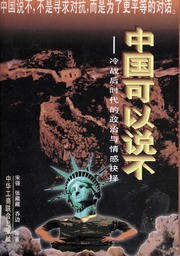 First edition | |
| Author |
|
|---|---|
| Country | China |
| Published | 1996 |
| Publisher | China Federation of Literary and Art Circles Publishing (中国文联出版社) |
| ISBN | 7505925458 |
| OCLC | 953046578 |
| Chinese name | |
| Simplified Chinese | 《中国可以说不:冷战后时代的政治与情感抉择》 |
| Traditional Chinese | 《中國可以說不:冷戰後時代的政治與情感抉擇》 |
| Hanyu Pinyin | Zhōngguó kěyǐ shuō bù: Lěngzhànhòu shídài de zhèngzhì yǔ qínggǎn juézé |
China Can Say No (中国可以说不) is a 1996 Chinese language non-fiction manifesto written and edited by Song Qiang, Zhang Zangzang (whose original name is Zhang Xiaobo), Qiao Bian, Tang Zhengyu, and Gu Qingsheng. It was published in China and strongly expresses Chinese nationalism. Its full title is often translated as The China That Can Say No: Political and Emotional Choices in the post Cold-War era. It became an overnight bestseller, as the authors called on the Beijing government to stand up against the United States in a new era of global competition. In addition the book bashes Japan for defection from Asia in favor of an American connection. The popularity indicates the growth of anti-American and anti-Japanese sentiment in the Chinese public. It indicates disillusionment among many younger and better educated Chinese as the nation searches for a major role in the global economic and political systems. The Beijing government originally endorsed the general thesis, but after sharp criticism from the United States and Asia, the government condemned the book as an irresponsible source of confusion, and banned it from circulation. [1]
- ^ Yuwu Song, ed., Encyclopedia of Chinese-American Relations (McFarland, 2009) pp 56-57.
© MMXXIII Rich X Search. We shall prevail. All rights reserved. Rich X Search
